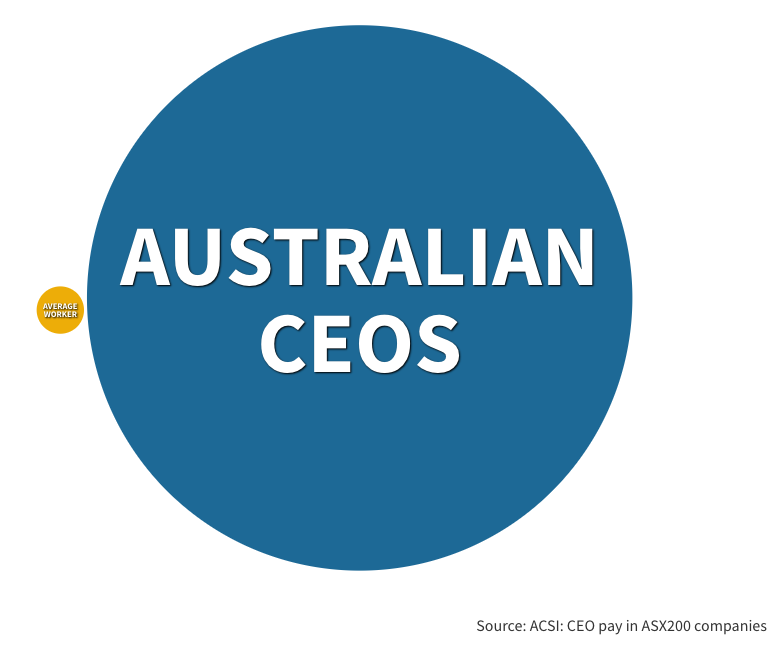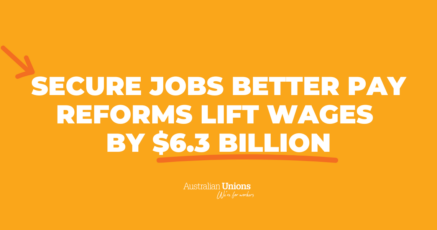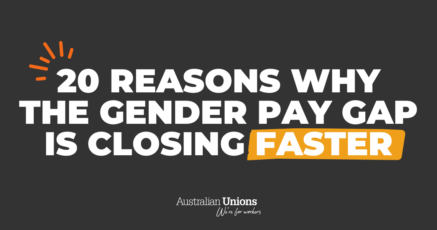How would you like to live like a CEO for a day? We’re certainly putting our hands up.
Chief Executive bonuses hit a new record high last year, averaging $2.31 million. CEOs of Australian top 100 companies now earn about 100 times average adult earnings.
The co-founders of Afterpay took home $264 million in pay last year – a whopping 3,829 times more than the average worker.
In comparison, wage growth is stalled at 2.4 per cent. Inflation is tipped to touch 7 per cent before the end of the year.
Working people are taking deep real pay cuts thanks to a bargaining system which no longer provides fair and consistent wage growth.
See that teeny-tiny yellow bubble? That represents that yearly income for the average worker: $69,000. No wonder it’s dwarfed by the $9.15 million Australian CEO average annual pay.

Like many of us, Australian Council of Trade Unions secretary Sally McManus is detecting some good old fashioned big business hypocrisy in the air.
“It appears there is no wage restraint or concern about inflation when it comes to executive pay. Companies continue to put up their prices rather than see any dent in their record profits,” she says.
“Working people are taking massive real pay cuts while executives receive record bonuses on the back of the value working people have created. Big business can afford wage increases, it is just that they do not want to give them and the collective bargaining system failing to deliver them,” McManus says.
What is happening to workers’ wages?
The data from the 2021 census shows us that the median annual income in Australia is $41,900 or $805 per week.
That amount is lower than the $69,000 average because it captures the median income of all 25 million Australians rather than just the 12 million employees represented in the $69,000 figure.
The median weekly income varies depending on where you live. So how does the state or territory you live in compare?
The dark red stain is the remarkably high median income earned by Canberrans. However, the numbers only tell half the story.
Although incomes may be higher compared to the rest of the country, so is the cost-of-living in the ACT. Canberra has some of the highest rents in Australia and those who aren’t on stable public service salaries are falling below the poverty line.
So when even workers’ incomes in our supposedly richest area are being left behind, big business pushing back against raising wages for our lowest paid just looks cheap.
Workers better off through collective bargaining
If you’re on the national minimum wage or a worker relying on Award determined wages, you’ll have seen an uptick in your payslip earnings since 1 July.
Those on minimum wage should see a 5.2 per cent pay rise while for those on Awards it’s a 4.6 per cent increase or an extra $40 per week (whichever of the two is highest).
Around one in four workers in Australia will receive those increases. They are the highest increases we’ve seen in decades, and it is thanks to union members coming together for decent wage growth that they happened.
The collective action that achieved the increase to the minimum wage is the same organising that propels strong wage growth for other workers too.
For around a third of workers in Australia today, pay increases are achieved through Enterprise Bargaining Agreements (EBAs). EBAs are where workers come together to negotiate with their employer for pay rises and better working conditions in exchange for improved productivity.
EBAs are required to offer better conditions overall than the relevant award that would otherwise apply. In other words, they are good news for workers looking for better wages.
But thanks to nine years of Liberal-National government working in the interests of big businesses rather workers, the laws supporting the bargaining system have been eroded.
The bargaining system is not delivering the wage growth that Australian workers need and deserve. We need a bargaining system which drives economic growth rather than locking working people out of it.
Sally McManus
ACTU secretary

The weakening of the bargaining system is the reason why we’ve seen Tuftmasters employees speak out against attempts to dilute pay and conditions, essential transport workers go on strike, and nurses and midwives take to the streets en masse.
The very workers we’ve relied on to endure the pandemic are calling out for decent pay so they can keep up with galloping cost-of-living. The best time to fix our bargaining system is now.
What makes enterprise bargaining so effective for workers is the same thing that will strengthen it: collective action.
That means building organised workplaces where workers in unions stand with each other. It’s why union members earn, on average, $250 more per week than non-union members.
Cover photo credit: Photo by Austin Distel on Unsplash







SHARE:
Australian CEOs earn 100 times more than the average worker